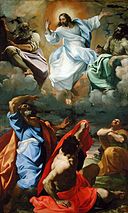 |
| Andre-Rublev's Saviour |

Homily preached by Br Luke at Blaxland 10th May 2015
6th Sunday of Easter year B
Gospel John 15:9-17
6th Sunday of Easter year B
Well I have a slight dilemma, which of John’s passages do I choose?
Both speak of love and of salvation. In the second reading John links Jesus’s death, baptism and the Holy Spirit as a threefold witness for divine actions. He goes further and says that God’s testimony regarding Jesus is this: “Whoever has the Son has life, whoever does not have the Son of God does not have life”. He can’t make it any clearer than that! But what does this mean to us? Do we have the Son of God? Indeed is this a question we have ever asked ourselves? Or do we think that because we call ourselves Christian this is enough. We assume that we have life? It really looks like a black and white question doesn't it.
In the Gospel, John records Jesus as saying: “If you keep my commandments, you will abide in my love”. And then Jesus says “This is my commandment: that you love one another as I have loved you”. Oh dear, - I suspect there are some in this world who would like to ask Jesus to rephrase that commandment. Something along the lines of: um can we have a discussion about this Jesus? Do we really have to love one another? I suspect he’d just silently look at us and then give us a ‘think about what you just said’ smile.
But we humans are an inventive lot, perhaps if we look hard enough, or explore the words in more detail, or interpret them differently we could find some little gap to squirm out of? Some nice loophole so that we can wander through and not concern ourselves with this instruction? Yes, strike a chord with anyone? After all loving one another is hard work. Especially if the other person is - well you know - ‘not like us’.
But Jesus doesn’t let us off lightly, he tells us we are his friends if we do this. Not his servants, not his slaves, his friends. He tells us this because he loves us and not because he orders us to do it. We will voluntarily follow the commandment because of his love for us and our love for him. After all, we are his friends – right? Sounds like an “O bugger” moment doesn’t it. You know that point when you suddenly realise with absolute clarity that you’ve got no excuses, no wriggle room, you’re committed to a course of action.
“You did not choose me, but I chose you. And I appointed you to go bear fruit, fruit that will last”. Hmm remember last week’s gospel? It was about the vine. We are the ‘grafted in’ branches and we bear fruit. If we do not produce fruit then we get pruned out? And here Jesus tells us, we are picked by him. He calls us to go and work in the vineyard. He is telling us so that we can “love one another”. Sorry people there is no wriggle room here. This is a divinely authored action. Now of course the reality in our lives is that we do not follow this commandment. Sadly we do not love one another. If we did there would be violence, there’d be no war or conflicts, and we’d have universal peace and goodwill among the peoples of the world.
So do we just throw our hands up and say ‘it’s all too hard’. Well no, that’s not what we do, because of we did, then as John told us earlier; “Whoever has the Son has life, whoever does not have the Son of God does not have life”. So our job, is to call out to the world, that love of neighbour, is not an illusion or a fanciful theory, but a real possibility. One that we can achieve, if we stop and think. If we pause and realise that the other person is really no different from us. Sure they may look different, they may speak a different language, they may have a different gender, or a different sexual orientation to us, but they are just like us. They bleed if they are cut, they cry if they are sad or distressed and they laugh if they are happy – and perhaps more importantly they love, just as we do.
So my challenge for you this week, is to look for someone who is different from you and ask yourself – not them – yourself, can you see yourself in them. Can you envisage a time, when you could talk to them and perhaps even regard them as a friend, not someone to be shunned and marginalised, even harmed? I caution you, it won’t be easy, but try anyway and then tell us about it at our Bible study on Friday.
Remember, Jesus loves us, he command us to love each other and when we do that, then we have life eternal. Amen.



